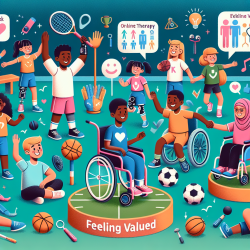As Special Education Directors, we continuously seek innovative and evidence-based strategies to support the diverse needs of our student populations, particularly bilingual children facing phonological challenges. A groundbreaking study, "Generalization of /s/ from English to French as a result of phonological remediation," by James C. McNutt, offers invaluable insights into the cross-linguistic generalization of phonological interventions. This research not only highlights the interconnectedness of language learning and phonological development but also provides a pathway for practitioners to enhance their therapeutic approaches for bilingual students.
Understanding the significance of generalization—the ability to apply learned skills across different contexts—is crucial in the realm of speech therapy. McNutt's study focuses on bilingual children with /s/ production errors in both English and French. Remarkably, the research found that therapy targeting /s/ production in English led to improved /s/ production in French, illustrating the potential for cross-linguistic generalization of phonological skills.
For practitioners, this study underscores the importance of incorporating generalization strategies into therapy plans. Here are several ways to implement these findings into practice:
- Emphasize Motor-Based Therapy Programs: McNutt's study utilized a motor-based therapy approach focusing on /s/ production. This method proved effective in facilitating generalization between languages. Incorporating similar motor-based techniques can be beneficial, especially for sounds common to both languages in a bilingual child's repertoire.
- Monitor Progress in Both Languages: Even when therapy is conducted in one language, regularly assessing progress in the child's second language can provide insights into generalization. This approach not only tracks therapeutic outcomes but also encourages a more holistic view of a child's phonological development.
- Engage in Multilingual Exposure: Encouraging exposure to both languages outside of therapy sessions can enhance generalization. Activities that involve listening and repeating sounds or words in both languages can reinforce skills learned during therapy.
- Customize Therapy to Individual Needs: While McNutt's study offers promising results, it's important to tailor therapy to the unique linguistic background and learning style of each child. Considering factors such as language spoken at home and the child's proficiency in each language can guide the customization of therapy plans.
This research also prompts further exploration into the mechanisms underlying cross-linguistic generalization and its implications for other phonemes and linguistic features. Encouraging practitioners to delve into this area can contribute to a richer understanding of bilingual phonological development and more effective therapeutic strategies.
In conclusion, McNutt's study provides compelling evidence of the benefits of targeting phonological errors in one language and observing generalization to another. By incorporating these insights into practice, speech therapists and educators can enhance the efficacy of their interventions, supporting bilingual children in achieving robust phonological skills across their languages. For those interested in exploring this topic further, the original research paper offers a detailed account of the study's methodology, findings, and implications for speech therapy practices.
To read the original research paper, please follow this link: Generalization of /s/ from English to French as a result of phonological remediation.










